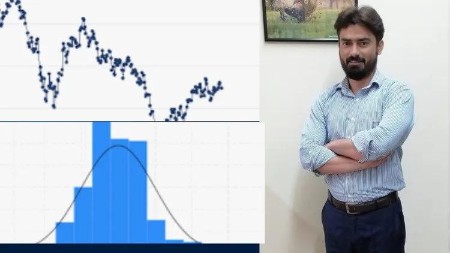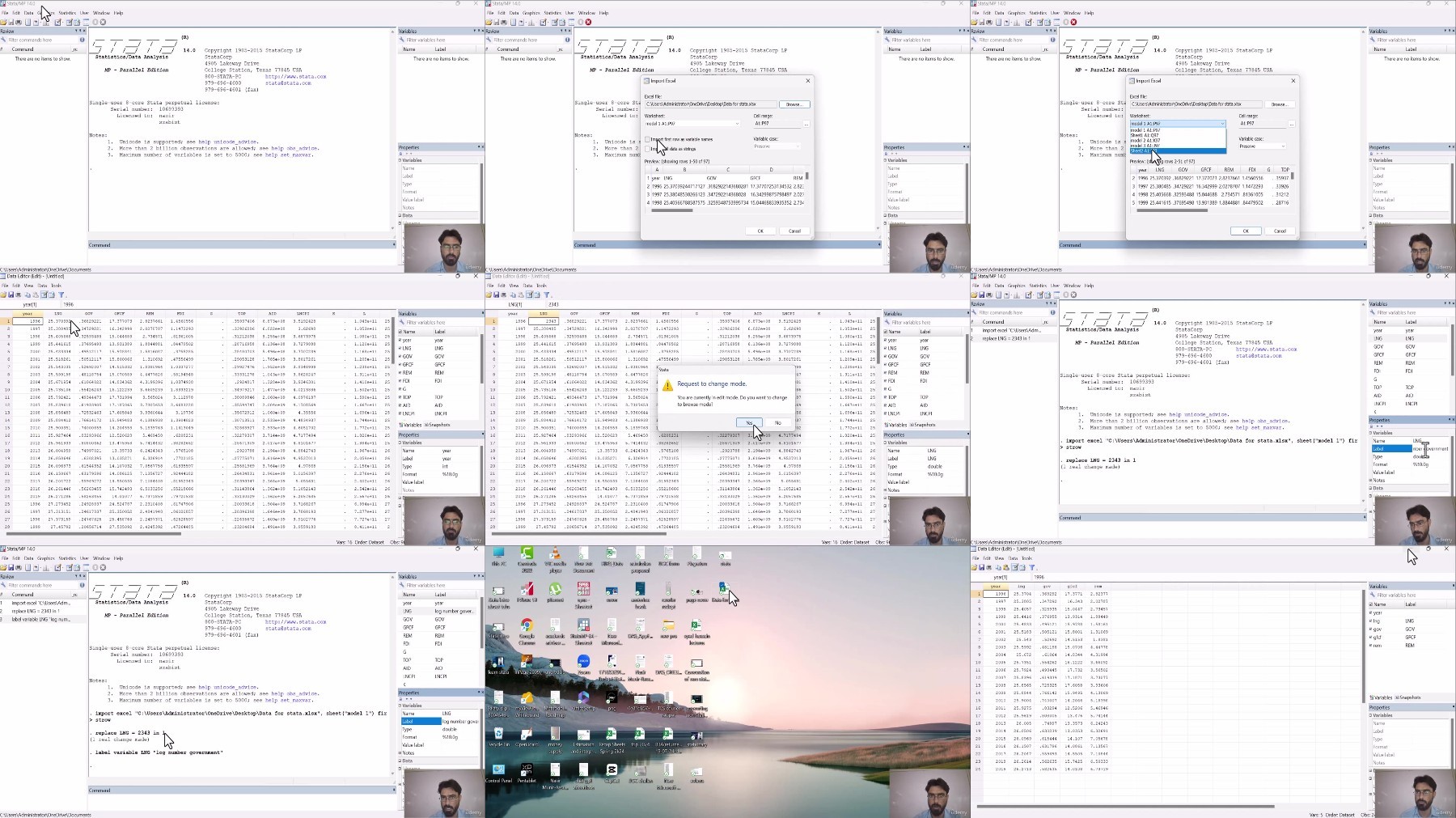STATA: Practical Application and Interpretation

STATA: Practical Application and Interpretation
Published 7/2024
Duration: 31m | .MP4 1280x720, 30 fps(r) | AAC, 44100 Hz, 2ch | 297 MB
Genre: eLearning | Language: English
Learn STATA with DNM
What you'll learn
Students will be able to navigate the STATA interface and use its basic commands.
Students will demonstrate the ability to import and manage datasets within STATA.
Students will perform descriptive and inferential statistical analyses using STATA.
Students will interpret statistical results and understand their implications.
Students will create and customize graphs and charts to present data effectively.
Requirements
Basic knowledge of Using computer.
Description
Course
Description
This course provides a comprehensive introduction to STATA, a powerful statistical software widely used in various fields such as economics, sociology, political science, and public health. The course focuses on the practical application of STATA, covering data management, statistical analysis, and interpretation of results. Students will learn how to perform a range of statistical tests, create meaningful visualizations, and draw valid conclusions from their data. Through hands-on exercises and real-world examples, students will develop the skills necessary to effectively use STATA for their research and professional needs.
Course Objectives
To provide students with a thorough understanding of the STATA interface and its functionalities.
To teach students how to import, manage, and manipulate datasets in STATA.
To equip students with the knowledge to perform a variety of statistical tests and analyses using STATA.
To enable students to interpret and communicate the results of their statistical analyses effectively.
To develop students' ability to create and customize data visualizations in STATA.
Introduction to STATA
Overview of STATA
Installation and setup
Navigating the STATA interface
Basic commands and syntax
Data types and structures in STATA
Data Management in STATA
Importing data from various sources (Excel, CSV, etc.)
Data cleaning and preparation
Data transformation (sorting, merging, reshaping)
Handling missing data
Descriptive Statistics
Summary statistics (mean, median, mode, etc.)
Frequency distributions and cross-tabulations
Measures of dispersion (variance, standard deviation, etc.)
Data visualization (histograms, bar charts, pie charts)
Inferential Statistics I
Hypothesis testing
t-tests (one-sample, independent, paired)
Chi-square tests
Analysis of variance (ANOVA)
Inferential Statistics II
Correlation analysis
Simple linear regression
Multiple regression analysis
Assumptions and diagnostics for regression models
Advanced Statistical Tests
Logistic regression
Factor analysis
Time series analysis
Panel data analysis
Data Visualization in STATA
Creating and customizing graphs (scatter plots, line graphs, etc.)
Enhancing visualizations with titles, labels, and legends
Exporting and presenting graphs
Using graph commands and options
Practical Applications and Case Studies
Applying STATA to real-world datasets
Conducting comprehensive analyses
Interpreting and reporting results
Case studies in various fields (economics, public health, etc.)
Advanced Data Management Techniques
Working with large datasets
Automating tasks with do-files and macros
Data validation and quality control
Using loops and programs in STATA
Preparing Reports and Documentation
Creating tables and reports in STATA
Documenting and annotating your work
Best practices for reproducible research
Sharing and collaborating on STATA projects
Special Topics in STATA
Survey data analysis
Handling complex survey designs
Advanced econometric techniques
Customizing STATA with user-written commands
Review and Final Project
Review of key concepts and techniques
Q&A and troubleshooting
Final project presentations
Course wrap-up and feedback
Who this course is for:
For all who is affiliated with the field of teaching, and doing research.
More Info

What you'll learn
Students will be able to navigate the STATA interface and use its basic commands.
Students will demonstrate the ability to import and manage datasets within STATA.
Students will perform descriptive and inferential statistical analyses using STATA.
Students will interpret statistical results and understand their implications.
Students will create and customize graphs and charts to present data effectively.
Requirements
Basic knowledge of Using computer.
Description
Course
Description
This course provides a comprehensive introduction to STATA, a powerful statistical software widely used in various fields such as economics, sociology, political science, and public health. The course focuses on the practical application of STATA, covering data management, statistical analysis, and interpretation of results. Students will learn how to perform a range of statistical tests, create meaningful visualizations, and draw valid conclusions from their data. Through hands-on exercises and real-world examples, students will develop the skills necessary to effectively use STATA for their research and professional needs.
Course Objectives
To provide students with a thorough understanding of the STATA interface and its functionalities.
To teach students how to import, manage, and manipulate datasets in STATA.
To equip students with the knowledge to perform a variety of statistical tests and analyses using STATA.
To enable students to interpret and communicate the results of their statistical analyses effectively.
To develop students' ability to create and customize data visualizations in STATA.
Introduction to STATA
Overview of STATA
Installation and setup
Navigating the STATA interface
Basic commands and syntax
Data types and structures in STATA
Data Management in STATA
Importing data from various sources (Excel, CSV, etc.)
Data cleaning and preparation
Data transformation (sorting, merging, reshaping)
Handling missing data
Descriptive Statistics
Summary statistics (mean, median, mode, etc.)
Frequency distributions and cross-tabulations
Measures of dispersion (variance, standard deviation, etc.)
Data visualization (histograms, bar charts, pie charts)
Inferential Statistics I
Hypothesis testing
t-tests (one-sample, independent, paired)
Chi-square tests
Analysis of variance (ANOVA)
Inferential Statistics II
Correlation analysis
Simple linear regression
Multiple regression analysis
Assumptions and diagnostics for regression models
Advanced Statistical Tests
Logistic regression
Factor analysis
Time series analysis
Panel data analysis
Data Visualization in STATA
Creating and customizing graphs (scatter plots, line graphs, etc.)
Enhancing visualizations with titles, labels, and legends
Exporting and presenting graphs
Using graph commands and options
Practical Applications and Case Studies
Applying STATA to real-world datasets
Conducting comprehensive analyses
Interpreting and reporting results
Case studies in various fields (economics, public health, etc.)
Advanced Data Management Techniques
Working with large datasets
Automating tasks with do-files and macros
Data validation and quality control
Using loops and programs in STATA
Preparing Reports and Documentation
Creating tables and reports in STATA
Documenting and annotating your work
Best practices for reproducible research
Sharing and collaborating on STATA projects
Special Topics in STATA
Survey data analysis
Handling complex survey designs
Advanced econometric techniques
Customizing STATA with user-written commands
Review and Final Project
Review of key concepts and techniques
Q&A and troubleshooting
Final project presentations
Course wrap-up and feedback
Who this course is for:
For all who is affiliated with the field of teaching, and doing research.
More Info

